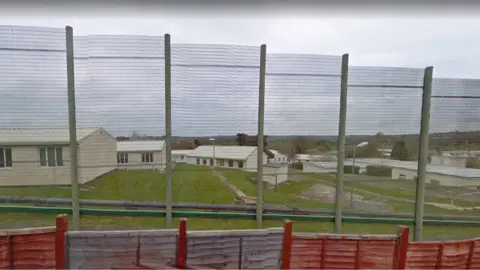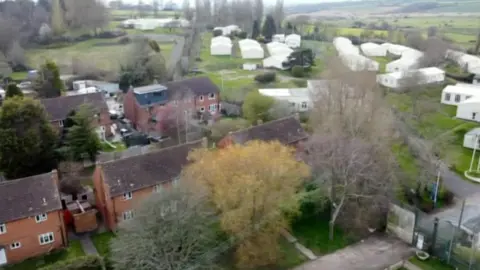Bexhill residents voice fears over plan for asylum seekers
 Google
GoogleResidents of Bexhill in East Sussex have said they feel "scared and intimidated" by plans to house asylum seekers on a site near their homes.
The government is working on a proposal to turn the former Northeye prison into accommodation for up to 1,200 men.
The site is about 30 metres from a housing estate, where one woman said she had not slept since she found out.
The Home Office said it understood locals' concerns and would work closely with key partners to manage the impact.
Immigration minister Robert Jenrick announced the plans last week for three disused military bases - in Lincolnshire, Essex, and East Sussex.
He told the Commons "the sheer number of small boats have overwhelmed the asylum system" and the new sites would reduce the need to rely on hotels.
 The proposed site
The proposed siteThe Bexhill residents spoke out as dozens of protesters began gathering in the town to demonstrate against the plans.
One woman, who lives close to the Northeye site, told the BBC: "I feel very vulnerable, very scared. I personally feel I will feel imprisoned in my own home."
Another said: "If there is a group of them hanging around at night, I am not going to feel secure."
However, Clare Moseley of refugee charity Care for Calais said such comments made her "feel sad" and were "based on misinformation".
"At the end of the day, refugees are just ordinary people that bad things have happened to. They are no different to you or I," she said.
About 800 men are expected in phase one of the site opening in September and there are plans to accommodate about 1,200 people by December.
They would be free to come and go but would be expected to return at night, the government has said, adding that onsite facilities would ensure their essential needs were met.
Meanwhile, the government has confirmed about 500 adult males would also be housed in a barge on the Dorset coast "in the coming months".
The Home Office said in a statement: "We understand the concerns of local communities and will work closely with councils and key partners to manage the impact of using these sites, including liaising with local police to make sure appropriate arrangements are in place."

Follow BBC South East on Facebook, on Twitter, and on Instagram. Send your story ideas to [email protected].
